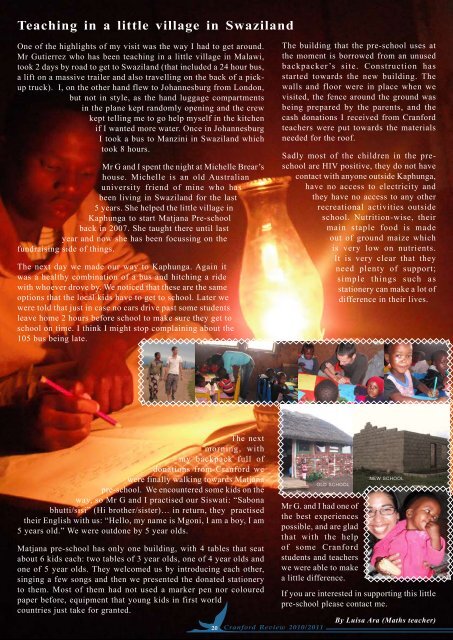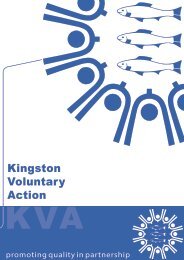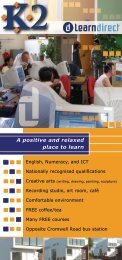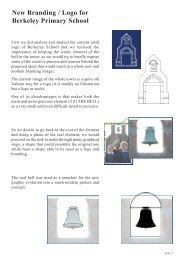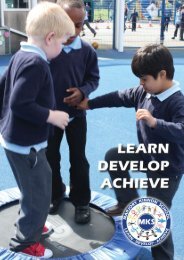Cranford Review 2010-2011 (Annual edition 2011)
“Cranford Review” © is a publication of Cranford Community College. Headteacher & Director: Kevin Prunty Editor-in-chief: Jessica Joyce Graphic design: Enzo Gianvittorio Danese (Enzo GD) Printed by: Springfieldpapers.com https://en.wikipedia.org/wiki/Cranford_Community_College
“Cranford Review” © is a publication of Cranford Community College.
Headteacher & Director: Kevin Prunty
Editor-in-chief: Jessica Joyce
Graphic design: Enzo Gianvittorio Danese (Enzo GD)
Printed by: Springfieldpapers.com
https://en.wikipedia.org/wiki/Cranford_Community_College
You also want an ePaper? Increase the reach of your titles
YUMPU automatically turns print PDFs into web optimized ePapers that Google loves.
Teaching in a little village in Swaziland<br />
Volunteering at a School and Orphanage in India<br />
One of the highlights of my visit was the way I had to get around.<br />
Mr Gutierrez who has been teaching in a little village in Malawi,<br />
took 2 days by road to get to Swaziland (that included a 24 hour bus,<br />
a lift on a massive trailer and also travelling on the back of a pickup<br />
truck). I, on the other hand flew to Johannesburg from London,<br />
but not in style, as the hand luggage compartments<br />
in the plane kept randomly opening and the crew<br />
kept telling me to go help myself in the kitchen<br />
if I wanted more water. Once in Johannesburg<br />
I took a bus to Manzini in Swaziland which<br />
took 8 hours.<br />
Mr G and I spent the night at Michelle Brear’s<br />
house. Michelle is an old Australian<br />
university friend of mine who has<br />
been living in Swaziland for the last<br />
5 years. She helped the little village in<br />
Kaphunga to start Matjana Pre-school<br />
back in 2007. She taught there until last<br />
year and now she has been focussing on the<br />
fundraising side of things.<br />
The next day we made our way to Kaphunga. Again it<br />
was a healthy combination of a bus and hitching a ride<br />
with whoever drove by. We noticed that these are the same<br />
options that the local kids have to get to school. Later we<br />
were told that just in case no cars drive past some students<br />
leave home 2 hours before school to make sure they get to<br />
school on time. I think I might stop complaining about the<br />
105 bus being late.<br />
The next<br />
morning, with<br />
my backpack full of<br />
donations from <strong>Cranford</strong> we<br />
were finally walking towards Matjana<br />
pre-school. We encountered some kids on the<br />
way, so Mr G and I practised our Siswati: “Sabona<br />
bhutti/sisi” (Hi brother/sister)… in return, they practised<br />
their English with us: “Hello, my name is Mgoni, I am a boy, I am<br />
5 years old.” We were outdone by 5 year olds.<br />
Matjana pre-school has only one building, with 4 tables that seat<br />
about 6 kids each: two tables of 3 year olds, one of 4 year olds and<br />
one of 5 year olds. They welcomed us by introducing each other,<br />
singing a few songs and then we presented the donated stationery<br />
to them. Most of them had not used a marker pen nor coloured<br />
paper before, equipment that young kids in first world<br />
countries just take for granted.<br />
The building that the pre-school uses at<br />
the moment is borrowed from an unused<br />
backpacker ’s site. Construction has<br />
started towards the new building. The<br />
walls and floor were in place when we<br />
visited, the fence around the ground was<br />
being prepared by the parents, and the<br />
cash donations I received from <strong>Cranford</strong><br />
teachers were put towards the materials<br />
needed for the roof.<br />
Sadly most of the children in the preschool<br />
are HIV positive, they do not have<br />
contact with anyone outside Kaphunga,<br />
have no access to electricity and<br />
they have no access to any other<br />
recreational activities outside<br />
school. Nutrition-wise, their<br />
main staple food is made<br />
out of ground maize which<br />
is very low on nutrients.<br />
It is very clear that they<br />
need plenty of support;<br />
simple things such as<br />
stationery can make a lot of<br />
difference in their lives.<br />
OLD SCHOOL<br />
Mr G. and I had one of<br />
the best experiences<br />
possible, and are glad<br />
that with the help<br />
of some <strong>Cranford</strong><br />
students and teachers<br />
we were able to make<br />
a little difference.<br />
NEW SCHOOL<br />
If you are interested in supporting this little<br />
pre-school please contact me.<br />
42 degrees, a bumpy ride and 24 hours later, I arrived in the tranquil and sleeping town of Dwarka. I was greeted<br />
by students with striking smiles, a perfect way for them to welcome me into their lives. It wasn’t long before<br />
introductions had taken place and we were all playing ice breaker activities. It was nice to put my native language<br />
Gujarati into good use. The kids were fascinated by the English language and eavesdropped on every single word<br />
I spoke and even attempted to mimic me when my back was turned. The grounds of the school and orphanage were<br />
really big, there were 16 dormitories and each room had 6 beds. It has its own farm so that the school doesn’t have<br />
to purchase milk from anywhere else; this is a great way to save money in the school and cows are considered<br />
to be an auspicious god. The school’s kitchens used wood as they don’t have a stove and many of the facilities<br />
are very basic. The students have to pull water out of a well to have a shower as there is no running water.<br />
A day into my trip I went on the hunt for equipment that I could use with the activities I had prepared. After<br />
searching for some time I came to the conclusion that there were none. After speaking to the students I learned<br />
that they only used a pen and a book in their classes. It was shocking to hear that the youngsters, who ranged<br />
from 6 to 18, had never used a colouring pencil, a felt-tip pen or even a normal pencil. I ran a hygiene promoting<br />
activity where the students had to design a poster about keeping clean. The activity went really well and they<br />
showed that they had a good understanding. All of them presented their work to everybody else and then we<br />
all displayed them around the school. While I was there I held 2 folk dancing programmes and also went on 3<br />
different visits to student’s homes.<br />
By Luisa Ara (Maths teacher)<br />
20 <strong>Cranford</strong> <strong>Review</strong> <strong>2010</strong>/<strong>2011</strong><br />
Excellence in all areas 21<br />
One student, Anand, lived about two hours away from the<br />
school. The journey took one hour in a bus to the nearest<br />
village and then another hour on a dirt track road in a<br />
‘chakra’ (motorbike with a trailer mounted on top). The<br />
roads are too small for the buses and the areas too remote.<br />
We were nearing his house when he pointed to a field; he<br />
said with excitement ‘that is my house’. All that could be<br />
seen was deserted land and a little tent like structure, a<br />
polythene sheet held up by tree logs. There was no running<br />
water or electricity, no sign of life, just the sun showing<br />
its presence on the dry parched land. Anand was proud<br />
to show us his father’s field; I took some presents for<br />
his brother and sister too. It was quite shocking to see<br />
the circumstances that Anand’s family endured but also<br />
I contemplated how tranquil and surreal the place was.<br />
There was a calf which provided milk for the family; their<br />
last cow had died because it had been bitten by a snake.<br />
Anand’s granny was happy to invite us onto their farm.<br />
She longed to see Anand get an education and tears welled<br />
up in her eyes in appreciation of the time and effort I took<br />
to see and visit Anand’s field.<br />
I could write endlessly about the tales of my<br />
adventure, a trip that will be remembered for<br />
a life time. Teaching the students of Dwarka<br />
who were deprived of a creative, interesting<br />
and dynamic education was very rewarding.<br />
I hope to accept<br />
their invitation, to<br />
return back again<br />
soon.<br />
By Mahavir Ladva<br />
(Learning Resource<br />
Centre Assistant)


